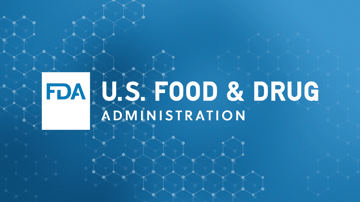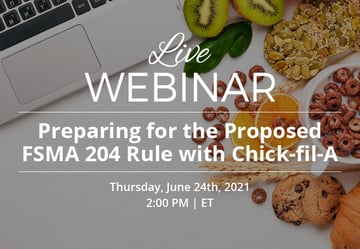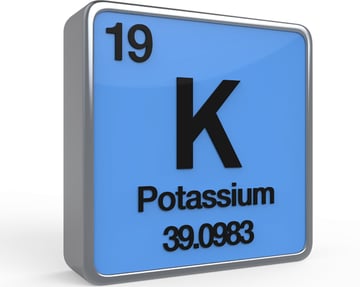It’s been over a year since the FDA announced the proposal of a Food Safety Modernization Act (FSMA) rule dedicated to the advancement of food traceability as part of the New Era of Smarter Food Safety initiative. Since the announcement in September 2020, stakeholders throughout the industry have placed significant emphasis on discussing how to lay the groundwork for end-to-end traceability, what next steps should be taken to prepare for the proposed rule, and how to ensure interoperability among varying systems.
As the FDA has continued to further define and refine the proposed regulation’s requirements, food and beverage brands’ approaches to initial preparation have varied. This past Sunday, November 7, marked one year from the FDA’s deadline for final rule submission, which must be provided to the Office of the Federal Register by November 7, 2022. With less than 365 days until rule finalization, the time to start preparing for pending FSMA 204 rule compliance is now.
Understanding the Proposed FSMA 204 Rule
Since its ratification in 2011, FSMA has served as the primary regulatory framework for food safety and consumer protections for the industry, articulating rules for more intelligent prevention and response throughout the food system. Food traceability is covered under FSMA Section 204, titled “Enhancing Tracking and Tracing of Food and Recordkeeping.” As detailed on the FDA site, this rule “instructs the FDA to develop additional recordkeeping requirements for certain foods to help establish clear tracing of a food product’s source when needed to address food safety risks.” Upon finalization, the regulation would enforce this key element of the milestone food safety law.
The proposed FSMA 204 rule lays the foundation for end-to-end food traceability, extending beyond the current “one-up and one-back” requirement, and focusing on tracking food at every step in the supply chain. Additionally, this pending regulation would create a first-of-its-kind standardized approach to traceability recordkeeping, paving the way for the industry to adopt and leverage more digital, tech-enabled traceability systems. As part of the finalization process, the FDA has conducted pilot programs, assessed global standards, and further developed recordkeeping requirements, particularly for food products deemed as high risk. The organization has also worked closely with industry associations, and has reviewed existing standards, industry initiatives and current approaches in order to harmonize and build upon these efforts in the proposed rule.
In its establishment of proposed requirements for additional traceability records for certain foods, the FDA has also designated a Food Traceability List (FTL), which details the products that would be subject to the regulation. This list includes a wide range of dairy, seafood and ready-to-eat items, and includes various categories such as fresh and shelf-stable. It’s also important to note that the proposed regulation would apply not only to the foods that appear on the Food Traceability List, but would also include foods identified on the list that are used as ingredients in other products. For instance, under the proposed rule, nut butters would be subject to additional recordkeeping requirements when sold individually and as ingredient(s) in sandwich crackers or cookies.
At the core of the FSMA 204 proposal is a requirement for those who manufacture, process, pack or hold foods on the Food Traceability List. According to the pending regulation, traceability records must be captured, maintained, legible and stored, and must be provided to the FDA within 24 hours of request. The FDA has defined the following Critical Tracking Events (CTEs): growing, receiving, creating, transformation and shipping. In addition, the organization has recommended that companies provide records of traceability data electronically to ensure response within the 24-hour time frame affiliated with a request. This is especially important when necessary to assist the FDA during an outbreak, recall or other threat to public health.
Preparing for the Pending Regulation Today
With less than a year until the FSMA 204 proposed ruling is finalized, it’s important to understand how your organization is working to ensure readiness today. How are you preparing, and what steps are you and your team taking to guarantee future compliance with the proposed recordkeeping requirements? Additionally, based on your business’ role in the supply chain and the products that you manufacture, process, pack or hold, what requirements must you meet?
Becoming familiar with the proposed FSMA 204 regulation is a crucial first step. This is in addition to developing an understanding of the Food Traceability List, and identifying the items for which your organization may need to establish additional traceability records and recordkeeping processes moving forward. As a retailer or foodservice operator, for example, you may be responsible for data related to several steps across the supply chain, especially if your brand owns the warehouses or distribution centers that service your stores.
Next steps might include assigning internal owners to determine the key individuals within your team that will be responsible for creating and executing preparatory strategies in anticipation of rule finalization. Note that, according to your business model, key functions and position in the supply chain, this preparation might occur both internally and in collaboration with external supply chain partners. In addition, it’s important to map and develop a detailed understanding of product lifecycles, particularly those that pertain to the Food Traceability List as standalone foods or ingredients in other final products. And lastly, it’s critical to evaluate the current capabilities that your organization has for ensuring future compliance with the proposed regulation today. This will help in identifying gaps and areas of focus as you and your team get ready for the additional recordkeeping requirements of tomorrow.
Embracing Collaboration to Prepare for Finalization
As the FDA progresses in its finalization of the proposed FSMA 204 rule, it’s critical to understand what steps your organization is taking to ensure readiness now, and where to focus your efforts moving forward. In the days leading up to November 2022, it will also be incredibly important to assess how stakeholders across the industry are preparing, as well as to identify areas of opportunity for collaboration and information sharing. As the industry-leading provider of food safety compliance, traceability, recall management and supply chain transparency solutions, FoodLogiQ is here to help. To discuss key components of the proposed FSMA 204 rule, as well as how your brand can strategically prepare for the finalized regulation, schedule some time with one of our experts.
Tag(s):
Other posts you might be interested in
View All Posts
Traceability
10 min read
| February 25, 2021
FoodLogiQ Commentary on the FDA's FSMA 204 Proposed Rule
Read More
Traceability
3 min read
| June 16, 2021
Preparing for the Proposed FSMA 204 Rule with Chick-fil-A
Read More
Food Labeling
3 min read
| November 16, 2016

